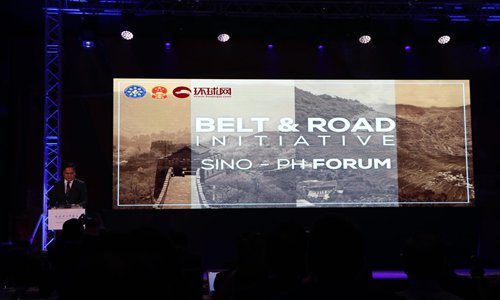BRI creates peaceful, inclusive growth
Officials, executives hail it as ‘Globalization 2.0’

Philippine Presidential Communications Operation Office Secretary Martin Andanar speaks at the the Belt and Road China-Philippines Forum on People-to-People Exchange & Economic Cooperation, in Manila on Friday. Photo: Li Qiaoyi/GT
The BRI is China's broadest platform for collaboration and cooperation, and given that China is on its way to being the largest economy in the world, scholars now describe the BRI as "Globalization 2.0" former Philippine president Gloria Macapagal Arroyo said in her speech at the Belt and Road China-Philippines Forum on People-to-People Exchange and Economic Cooperation.
"I appreciate that China is now developing into a powerful advocate for safeguarding and developing an open world economy. This is significant in the face of the rise of anti-globalization in favor of old-style nationalism in the US," she said.
Ties between the Philippines and China have reached new heights during the administrations of President Rodrigo Duterte and President Xi Jinping, Arroyo said.
In November 2018, leaders of the two countries lifted ties to comprehensive strategic cooperation relations, sending a strong message that the two countries are partners in seeking common development.
In a fresh sign of closer ties between the two Asian nations, the 22nd China-Philippines diplomatic consultation was hosted in Manila on Tuesday.
At a regular news conference on Friday, Chinese Foreign Ministry spokesperson Hua Chunying said that the consultation, the first since the establishment of bilateral comprehensive strategic cooperative relations, highlighted an unswerving commitment to neighborly friendliness and the deepening of BRI cooperation. The two nations will always be good neighbors, friends and partners, Hua noted.
"All [BRI project] progress will have to be improved," Arthur Tugade, secretary of the Philippine Department of Transportation, told the Global Times on the sidelines of a sub-forum on infrastructure construction cooperation.
He called on the two governments to continue dialogue to complete the projects sooner.
Numerous projects are in the pipeline, such as the $3 billion investment of PowerChina that will include power stations in Lanao Del Norte and Bataan, according to Henry Lim Bon Liong, president of the Federation of Filipino Chinese Chambers of Commerce and Industry.
CNOOC is participating in a liquefied natural gas project in Batangas. China Telecom is also the partner of the third Filipino telecom operator which is expected to deliver excellent service to Filipinos, he said at the forum.
China has now become the Philippines' largest trading partner and a major source of foreign investments.
"These projects are creating thousands of jobs for our people and are helping unleash the potential of our untapped resources. As such, we consider this a boost to our infrastructure development, particularly to the government's Build, Build, Build program," Lim said.
Rather than a competitor, China has proven to be a partner in development, it is a market for developing countries, a donor, a provider of capital and technology, Arroyo said.
BRI is a peaceful development model and not being used to gain any geopolitical advantage, Tan Qingsheng, deputy chief of mission and minister counselor at the Chinese embassy in the Philippines, said at the forum.
"BRI is a pie for everyone to share," he stressed.
Philippine Presidential Communications Operation Office Secretary Martin Andanar said the idea behind BRI, as presented to over a hundred countries that agreed to participate, is to encourage each country to be internally productive, to trade goods, services and technology, and to do progressive business with all nations.
"BRI is the best alternative to war," Andanar said.
In the words of Francis Chua, chairman of the Philippine Silk Road International Chamber of Commerce, "Today, problems like the South China Sea dispute are heavily debated. Even the fishing boat incident was blown out of proportion." These issues can be resolved through better engagement among people, according to Chua.
Hua said because of the joint efforts of China, the Philippines and other countries in the region, the South China Sea situation is stable.
There are growing signs that people-to-people exchanges are increasing, which set the stage for closer China-Philippines ties on multiple fronts.
In the administration immediately preceding Duterte's, almost no Chinese tourists came to the Philippines. Today, 1.5 million Chinese tourists visit the Philippines, according to Arroyo, and she urged her nation to attract even more Chinese visitors for the tourism sector to play a bigger part in bilateral relations.

